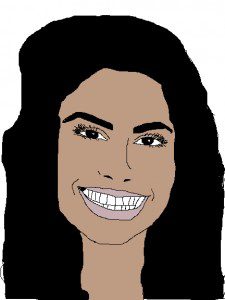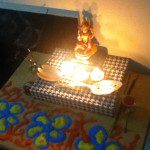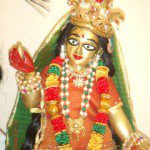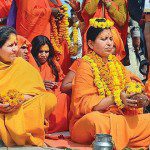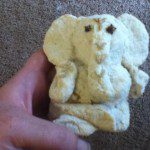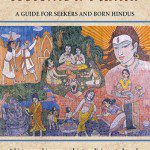My friend Pava is someone that I see frequently in real life and I find her to be very thoughtful about all the issues of faith, religion, culture, and self-expression. When I first met her, I was a little afraid that she wouldn’t like me; that she would find me offensive. Instead we became fast friends and speak often about religion. She is Jain and today in her interview she’ll explain a little bit about how that’s different from Hinduism.
1) Tell us about you and your family. Were you born in the U.S.? Were your parents? Are they from India or Africa or somewhere else?
I was born in the US. My parents came from India to the US at around the time they got married.
2) What religion is your family and would you consider yourself that religion also?
My family is Jain, and yes. =)
3) Can you tell us about the differences and similarities with Hinduism?
I am no authority on the subject, but I can speak about what I know. (It’s strangely difficult to find unbiased resources on the topic.)
Jainism is a way of life focused on nonviolence, non-attachment, and non-absolutism. Like Hinduism, Jainism accepts reincarnation. Unlike Hinduism, Jainism has no gods. Jains do revere souls who have liberated themselves, through good karma (another principle in common with Hinduism), from the cycle of birth and death.
I grew up celebrating Hindu holidays and joining Hindu religious festivals without knowing or caring about the difference. (My family also celebrates Christmas in a very secular way.) Jainism is rich with stories of heroes, miracles, and the revered Tirthankaras (the 24 souls who have attained liberation). These are distinct from Hindu lore, though as a child I got the stories mixed up. Jainism, as a religion, does not recognize Hindu scriptures and vice versa.
3) Do you see yourself as a spiritual or religious person?
Spiritual. Many Jain rituals exist, but I’ve never derived much meaning from religious rituals in general- often I feel like I’m just going through the motions of them when required of me. Personal prayer and thoughtful living are much more important to me than scripted prayers, fasting etc, though I understand and respect the importance of adherence to ritual in other people’s religious and spiritual lives.
4) What role, if any, does religion play in your life?
I don’t look at my options and consciously think “Which is the most Jain?,” but Jain principles are part of my personal moral code and my understanding of right and wrong.
While most formal rituals don’t really do a lot for me (as in, the meaning doesn’t touch or transform me), I do pray silently before I go to sleep, before I drive anywhere (even a short distance), and before important events such as job interviews. One of the many functions of this is that it calms me and helps me focus.
Nonviolence is the principle that affects the way I live my life in the most tangible way. I don’t eat meat, which is not a big deal to me because I didn’t eat it growing up and thus don’t “know what I’m missing” or feel any desire to try it. Ideological reasons aside, it just doesn’t look or smell appetizing to me because I didn’t grow up thinking of it as food. I also avoid buying fur, leather, or silk- which isn’t difficult or cumbersome either. The only time I have to think about it is when I buy shoes, and so many shoes are made with synthetic materials that it’s hardly an issue. Also, I try to buy locally to encourage local businesses and ethical practices.
One of Jainism’s core tenets, anekantavada, translates to “non-absolutism.” This means plurality of viewpoints, and encourages Jains to listen to, consider, and understand other people’s ideas of truth. If we don’t come to agree with their ideas, we should at least respect them and not push our dogma on them. I consider this to be extremely important in my life, almost on par with nonviolence. I actually didn’t know what non-absolutism meant until last year, but it was part of my philosophy long before that, and I was happy to find out that Jainism emphasizes something that’s always been so important to me.
5) Do you feel any conflict between your American identity and your Indian identity?
Absolutely. I don’t think there is inherent conflict, but I do feel conflict between the way I was raised (my parents’ version of Indian), and the person I have become. I know that healthy people continue to grow and change and question their perspectives throughout their lives- but in many ways I feel that the person I have become would be seen as a betrayal by many Indian people, especially by the older generations, but also by my Indian peers.
For a few years I rebelled and found it thrilling- but I don’t know when the rebellion stopped being rebellion and started becoming an authentic representation of who I am. I’ve come to think that all traditions should be questioned, because unquestioning and unthinking adherence to/reliance on tradition is what perpetuates destructive cycles. This doesn’t mean that I reject all traditions- it means that I make an effort to think carefully about the meanings of traditions, which has resulted in me keeping a strange cocktail of traditions in my life. My initial reaction to any tradition, though, is one of suspicion.
I still feel connected to Jain principles, but have rejected aspects of “Indian culture” as interpreted by my elders. I continue to be vegetarian and never felt any desire to deviate from that, but I don’t agree with the idea that alcohol is an absolute evil. (Obviously drinking to excess leads to bad things, but I don’t see social drinking, in moderation and with awareness of one’s limits, as a bad thing at all.) I also disagree with the emphases on chastity and “modest” dress: to me this equates to sexual repression, body-shaming, and a whole host of antifeminist ideas. Another aspect I disagree with, about both Indian and American culture, is the prescribed role for women. Indian people I’ve known seem to place all women on a pedestal of virtue or even divinity: and then use that ideal to burden us, box us into limiting roles, and then shame us for not living up to impossible ideals. (American culture seems to burden, limit, and shame women, without the veneer or excuse of deification. I’m not sure which is worse.)
The main aspect of Indian culture (as it’s been presented to me) that I disagree with is the isolationism. I think that surrounding oneself with mainly Indian people and restricting oneself to Indian or Indian-approved ideas is harmful. It’s possible to maintain one’s Indian-ness while mixing, in every degree, with non-Indian people. I don’t know if my “Indian-ness” is something I need to cling to, but even if I did, I think that good people should never reject a person based on skin color, ethnicity, or cultural background.
I should stress that I don’t think the Indian culture that I grew up with is actual Indian culture. My cousins in India were raised much more liberally than me. I think this is because my parents immigrated to the US as adults and felt obligated to preserve Indian culture through their children in a foreign land. Therefore, they raised us with a version of Indian culture that didn’t keep pace with the evolution of culture actually happening in India. My aunts/uncles in India felt no such obligation when raising my cousins.
6) If so, which is more important in your life or are they equal?
American culture is far more important to me at this point.
7) How would you define “culture”?
Culture is learned behavior. That’s the broadest definition that I can think of- and I think in this case, a broad definition is appropriate. It’s very easy to get hung up on culture and exaggerate its importance, which is usually fine, but sometimes that kind of thinking leads to the perpetuation of harmful stereotypes so I try to stay away from it.
8) Do you believe that culture and race are connected?
No. I think that race and culture end up being correlated, but the connection is artificial, not inherent. For example, a child raised with all of the ideas, objects, and stimuli of Indian culture will be an Indian child, whatever color the child’s skin is, whatever the child’s biological parentage.
9) When non-Indian Americans like bindis, Bollywood movies, or om tattoos, how do you feel about it?
This is interesting, because most of the time I don’t mind. I occasionally get irritated when people tell me Madonna invented henna, or fetishize historical oppressive structures like the caste system- but mostly I think it’s fine to incorporate Indian or Indian-inspired fashions, foods, and fads into American culture. When it comes to symbols of greater significance, that’s when it gets complicated- but if people make the effort to learn what they mean, I think it’s wonderful. Objects and symbols have different degrees of meaning to each person. If someone gets an Om tattoo just because they find the symbol and idea to be cool, that doesn’t and shouldn’t damage the meaning that a deeply devout Hindu person finds in the same symbol.
That said, I think cultural appropriation is something to take very seriously. I think I don’t get too fussed about it because, while I’m aware of how the British and other groups exploited Indian people in history, I feel that I am American and don’t pay much heed to the historical associations that make my parents’ blood boil. I feel removed from them. When I look at a white person I do not see their ancestors who oppressed mine. This is also because Indian-Americans are a relatively privileged minority group, whose history in the US is not as wrought with violence and horror as many other groups.
Recalling your recent post about Halloween, I want to add that I’ve seen “Bollywood queen” costumes for sale at Party City. To me, “sexy” Native American costumes seem much worse than “Bollywood Queen.” One reason for this is that a “Bollywood queen” is a very specific kind of Indian person- an actress of a film genre- whereas “sexy Native American” generalizes and belittles many entire, distinct groups of people. However, if the $20 costume set were “Kreepy Kali: Hindu Villain” in Marvel-comic colors, I’d be much more upset. Costumes and fads that dismiss of mock groups of people, or reduce them to something other than complex and respected human beings, are generally offensive, but if they are appreciative and respectful, then I usually don’t find them offensive. Costumes that mock/trivialize the symbols held sacred by historically marginalized groups are the worst form of cultural appropriation, because they perpetuate the idea that those groups of people shouldn’t be taken seriously or treated as well as the majority group.
10) What is your relationship with your family like? How do they respond to your American-ness?
I have a good relationship with them, but at the same time, being around my family makes me feel like I have to perform. Not that I cannot be myself- more that I have to be an edited version of myself. I dress conservatively and keep quiet about some (though not all) of my more radical opinions and ideas. I guess I self-edit to seem more “Indian” and “good”(traditional), and showcase the aspects of my personality that they already know, while shielding them from the ideas and aspects of me that would make them angry. I am more open with family members closer to my age.
They respond to some aspects of my American-ness with pride and happiness, and others with confusion, anxiety, and sometimes anger when my ideas directly oppose their own. I haven’t shown my parents the full extent of my “American-ness” (or my “me-ness”, because “American” doesn’t perfectly describe my ideas or way of life).
11) Do you feel pressures from your family or community to be a certain way?
Yes, but this pressure matters to me less and less. It used to make me angry and feel guilty most of the time, but now I’ve figured out how to interact with family/community members without ruffling feathers or inciting unnecessary conflict. This takes effort and becomes exhausting after a while.
Also, my family and community have come to understand, lately, that some of my deviations from the prescribed lifestyle/choices/outlook are not necessarily bad. For most of my life I was actively discouraged from pursuing my passions because they did not lead to pre-approved respectable careers, but when I still didn’t get into med school after many years of ridiculous effort, I felt more free to follow my actual passions and eschew guilt/shame.
I don’t think that I will ever be fully accepted by my family/community the way I am, which sometimes makes me sad- but I don’t think any family ever fully accepts the decisions, ideas, and lifestyles of its members. I am fortunate to have friends who I can talk to about everything.
***
Pava’s answer for number 8 is really interesting: “a child raised with all of the ideas, objects, and stimuli of Indian culture will be an Indian child, whatever color the child’s skin is, whatever the child’s biological parentage.” I think that means that my children will be Indian! 😉
After seeing her answer for number 9 and the discussion of the Halloween costume, I happened to stumble upon a perfect and horrifying example of exactly that: a “scary” Kali doll made out of a Barbie by an artist who does not appear to have any connection to India or Hinduism and I had to share the horror with Pava.

